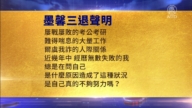【新唐人2012年6月11日訊】5月31號,三百多名「非北京籍學生」的家長,第24次來到教育部信訪辦,為孩子不能參加北京高考而申訴。兩年來,他們每個月都來到這裡。教育部部長袁貴仁在今年「兩會」上表態,年內會公布「隨遷子女異地高考」方案。但直到高考前夕,家長們依然沒有盼來任何消息。
10萬多人簽名,2000多名志願者,連續3年堅持不懈到教育部門表達訴求……這是一個為了孩子能接受公平教育,而聚集到一起並不斷壯大的群體。
據第六次人口普查數據,中國目前有2700萬「隨遷子女」,但按照高考「戶籍」、「學籍」雙認證規定,他們必須回原籍報名參加高考,哪怕在就讀地已經取得學籍多年。
「北京師範大學中國勞工問題研究中心」副研究員張網成指出,雖然中國表面上看起來更開放,但是實際上社會分層越來越複雜,高考制度的不公平也越來越嚴重。
張網成:「但是具體去改變某些東西,相對來說比較困難,而且可能會越來越困難。 記者(為甚麼﹖)因為既得利益集團已經形成了。比如像北京,他不可能完全打開這東西。一旦形成隔閡以後,你要再打破就涉及到階層利益的問題。現在有集團利益,有階層利益,有區域利益,中國的利益分配相對來說比較複雜。」
孩子的前途牽動著家長的心。家長們每個月到教育部信訪辦聚集。沒人接見、沒人收材料,他們把三年多來的爭權經歷做成海報展出,家長輪番上臺演講,講述自己孩子的遭遇,家長們極力避免成為維穩力量打擊的對像,竭力以溫和理性的面貌企盼當局溝通。
在家長的努力下,近兩年,有數十名北京市人大代表聯名提交「合理解決非北京戶籍居民的子女參加北京地區中考和高考」的提案。教育部部長也不得不連續兩年做出相應表態,說,「很快將出方案,目前正在加強調研」。
溫家寶總理在2011年也曾提出,「抓緊研究制訂隨遷子女接受義務教育後,在輸入地參加升學考試的辦法。」 但至今教育部門仍未出臺任何政策。
北京註冊會計師杜延林說,一些學者和官員,他們往往以事情複雜的理由搪塞,其實就是立場問題,就是不想放棄既得利益集團本身的利益問題。
杜延林:「最根本的不是難易的問題,而是想不想做的問題。有一部分人不想失去他的利益。普通的北京人,普通的上海人其實是跟著這些既得利益集團,這些控制資源的高官在享受一些福利。但是本質的是高官不想放棄他們這些特權。」
杜延林說,根本的癥結還是沒有一個公平的法治環境,沒有一個公平的民主機制。因為在一個正常的國家,在一個民主國家,所有問題都會提交到議會進行表決,乃至全民公決。
杜延林:「但是在我們這樣一個國家,任何問題都是由當權者自己說了算。而他又是站在他自己立場上看問題。所以在這樣一個環境下,你所有的不公平都很難指望他們開恩去給你解決。」
官員們坦承,牽扯利益太複雜,這是一塊難以撬動的奶酪。教育部副部長杜玉波在今年「兩會」表示,「解決異地高考的問題,既要解決隨遷子女的考試問題,又不能影響北京、上海當地考生的權益」。教育部原副部長吳啟迪也曾說,異地高考牽涉的利益很複雜,這不是教育部一家就能解決的問題。
採訪編輯/秦雪 後製/蕭宇
Non-Beijing Residents Can’t take college entrance exams in Beijing
On May 31, more than 300 students parents, who are
not resident in Beijing, came to the Petition Office of the Ministry of Education.
They were appealing against their children not being
allowed to participate in Beijing college entrance exams.
They have appealed there every
month during the past 2 years.
Yuan Guiren, section head of the Ministry of Education
claimed that plans for students taking entrance exams
in other provinces would be released at this year’s National
People’s Congress and Political Consultative Conference.
The parents however have not heard any good news
before their children’s exam.
Over 100,000 people have signed the petition,
and over 2000 volunteers have appealed
to the Ministry of Education over the last 3 years.
There is a growing group asking
for fair education for their children.
According to Sixth Population Census data, 27 million
students have moved to other places with their parents.
Based on the college entrance exam policy, they have
to go back to their city of birth to participate in the exams.
This is even if they have previously graduated.
Zhang Gangcheng, research associate at China Labor
Research Center in Beijing Normal University commented.
Although China seems open on the surface,
its social hierarchy is actually increasingly complex.
College entrance exams have become increasingly unfair.
Zhang Gangcheng: “It’s hard to change something,
and is can be more and more difficult.
This is because the vested interest group is already formed.
Take Beijing, it can’t be broken through.
Once there is conflict, you will touch the issue of class
interest if you break through the conflict.
Right now there is group interest,
class interest, and area interest.
The distribution of interest in China is very complex.”
Parents care about their children’s future.
They gather at the Petition Office
of the Ministry of Education every month.
No officer, however, would see them or take their materials.
They made a poster about their experiences
pursuing their rights over 3 years.
The parents take turns to give speeches on stage,
telling people their children’s unfair experiences.
Parents are trying their best not to be the target
of suppression by the government.
They use mild and rational ways to
ask for communication with the authorities.
As a result of these parent’s efforts, more than 10 Beijing
People’s Congress representatives submitted a proposal.
This is to 『appropriately solve the issue of students of
non-Beijing residents taking college entrance exams in Beijing』.
Prime Minister Wen Jiabao also spoke of this issue in 2011.
“We should hurry to find a method to solve the issue
of students taking the exam in other provinces.”
To date, there has been no policy made.
Du Yanlin, a Beijing certified public accountant commented.
Some scholars and officials usually take the complexity
of an issue to be an excuse.
Actually it’s the issue of their standpoint.
The issue is if they want to give up their interests or not.
Du Yanlin: “The root issue is not how difficult it is,
but if they want to deal with it or not.
Some people don’t want to lose their interest.
Normal Beijing people and normal Shanghai people
are actually following the vested interest group,
and officials who control resources and benefits.
The root is that those high level officials
don’t want to lose their privileges.”
Du Yanlin says the root problem is that there is not a fair
legal environment, nor a fair democratic mechanism.
In a normal state, a democratic state, all issues should
be submitted to parliament, and even society, to judge.
Du Yanlin: “But in our country, the authority judges all issues.
But they see the issues from their point of view.
Thus, you can’t rely on them to solve unfair issues
under such an environment.”
Officials admit that this issue involves complex
interests, so it’s a hard issue to leverage.
Du Yubo, Vice Minister of the Ministry of Education spoke
about the issue for this year’s National Peoples Congress.
“To solve the issue of taking college entrance exams
in other provinces, we not only need to solve the problem,
but also not to influence local students interests
in Beijing and Shanghai.”
Former Vice Minister of the Ministry of Education Wu Qidi
also said that taking the exam in other areas involves complex issues of interest.
The Minister of Education cannot
solve this problem on his own.




























